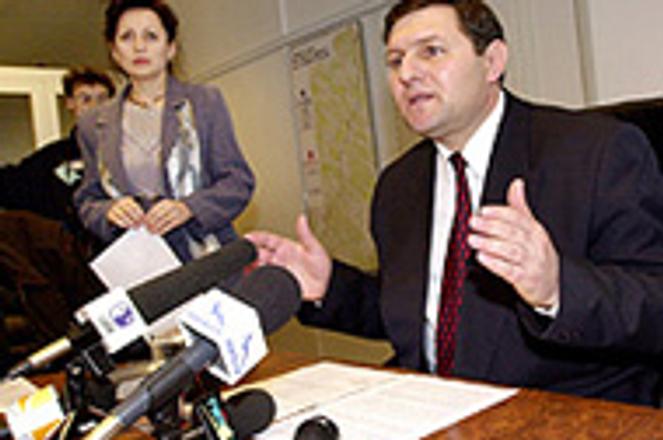SE director Štefan Košovan protests his innocence at a press conference called after allegations of corruption.photo: TASR
An event in March showed that the Slovak economy, and some of its most important companies, are still far from free of the influence of political meddling.
The sacking of Štefan Košovan as head of the state electricity utitlity Slovenské Elektrárne (SE) reminded everyone of the power struggles behind the biggest firms in Slovakia. Slated for privatisation some time over the next 18 months, the furore over Košovan's sacking on suspicion of awarding sweet contracts to party sympathisers had wide repercussions.
Faced with a small crisis in the coalition, the government moved to defuse the tension March 28 when a senior government body, the Coalition Council, agreed to review the conduct of all directors of state-owned banks and monopolies. The bargain answered some of the demands of the Democratic Left Party (SDĽ), which had appointed Košovan to his SE post.
SDĽ Chairman Jozef Migaš announced to media that if the personnel audits revealed wrongdoing at other state-owned institutions, new directors would be found through a series of expert tenders rather than through political appointment. The deal represented a compromise between Deputy Prime Minister Ivan Mikloš' call for expert tenders and the SDĽ's claim that its appointees were being singled out for the new policy.
Foreign investors welcomed the initiative, but remained somewhat dubious that Slovakia's key companies would be entirely rid of the spectre of political influence, saying they would watch the process closely to see if cronyism was actually being eliminated.
Immediately after the Košovan dismissal, SDĽ Vice-Chairman Peter Weiss urged Mikloš' SDK party to examine the relationship between Prime Minister Mikuláš Dzurinda and Dušan Jurčák, the president of the state bank Slovenská sporiteľňa.
"Mr. Mikloš said that the firing of Košovan was the first result of a fight against corruption," said Weiss. "Does that mean that Mr. Mikloš doesn't consider the friendship between Mr. Dzurinda and Jurčak as smelling of clientelism? Or is it clientelism only in the case of friendship between our head Jozef Migaš and Košovan?"
Mikloš countered that the performance of the the bank's president and of other SDK appointees made it unnecessary that they be recalled from their positions. "There aren't any reasons to recall, for example, Mr. Jurčák from the post of president of Slovenská Sporiteľňa because everyone can see that the bank is on track," he said.
The recall of Košovan and long-simmering criticism of the way SDK officials handled affairs at SPP led potential investors to question the transparency of state firm administration and the health of the business environment in Slovakia.
"Of course [these type of appointments and transparency in general] are obviously a criteria for us when considering investment. The business environment is important to us," said John Miller, senior manager for international business development at Raytheon Systems Company, an American firm considering investment in Slovakia.
But in many ways, it emerged that room for corruption had been embedded in the system. As part of an unwritten agreement between the coalition parties that was concluded following their election victory in September 1998, the heads of such state firms as gas giant Slovenský Plynárenský Priemysel (SPP) and telecom firm Slovenské telekommunikácie (ST) were divided up between the SDK, SDĽ, Hungarian Coalition Party (SMK) and the Party of Civic Understanding (SOP).
The fact that each state firm was 'led' by a political nominee appointed by a different party was supposed to provide a system of cross-controls among government parties on the running of the companies, and thus some measure of protection against a return to the cronyism that government officials declared was a feature of the previous government led by Vladimír Mečiar.
Author: Compiled by Ed Holt


